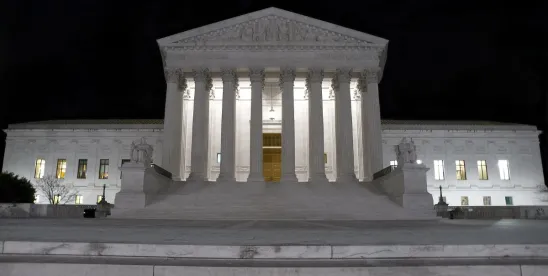Lets talk about something important.
If you haven’t read the U.S. Supreme Court’s recent opinion in McLaughlin Chriopractric v. McKesson, you may want to do so now. It’s a very very important ruling that will have a HUGE impact on TCPAWorld.
Why?
Because McLaughlin reshapes how courts are to treat agency interpretations of the TCPA, especially around consent for informational calls. And if your business has been relying on FCC guidance for your TCPA compliance, it’s time to stop and reconsider.
As a refresh, in McLaughlin, the Supreme Court held that The Hobbs Act does not bind district courts in civil enforcement proceedings to an agency’s interpretation of a statute. This means that district courts must independently determine the law’s meaning under ordinary principles of statutory interpretation while affording appropriate respect to the agency’s interpretation. While courts may still consider agency interpretations, they are no longer required to follow them.
To fully grasp the ruling’s impact on consent for informational calls, lets begin with the basics.
Under the TCPA, it is a violation to make any call (other than a call made for emergency purposes or made with the prior express consent of the called party) using any automatic telephone dialing system or an artificial or prerecorded voice. Therefore, prior express consent is a critical defense in TCPA cases for a defendant.
Does this defense apply to all types of calls?
Well, the TCPA imposes different consent requirements depending on the nature of the call.
If you are making a call for a marketing purpose (a telemarketing call), you must have the consumer’s prior express written consent.
If you are making a call for an informational purpose, on the other hand, you must have the consumer’s prior express consent.
What is the key difference here?
For informational messages, you are only required to obtain a consumer’s express consent, which does not require the full written consent but does need to clearly have the consumer express an intention to receive calls.
This is where things get complicated.
For many years, an FCC ruling from 2009 implied express consent to use such technology any time a consumer provided their number to a caller for a purpose “closely related” to the purpose of the call. For instance, giving a number to a bank and receiving a fraud alert—it was presumed that valid express consent existed. This interpretation gave businesses some comfort, particularly in contexts like healthcare, financial services, and debt collection, where informational communications are essential. Even in the retail space, if a consumer provided a phone number while creating an account or during checkout, businesses presumed they had valid express consent to send informational messages to that consumer.
As far back as 1992, the FCC stated that “[p]ersons who knowingly release their phone numbers have in effect given their invitation or permission to be called at the number which they have given, absent instructions to the contrary. Hence, telemarketers will not violate [TCPA rules] by calling a number which was provided as one to which the called party wishes to be reached.” In re Rules and Regulations Implementing the Telephone Consumer Protection Act of 1991, Report and Order, 7 FCC Rcd 8752, 8769 ¶ 31 (Oct. 16, 1992) (the “FCC Order”).
Subsequently in 2008, in the context of debt collection calls, the FCC concluded that “the provision of a cell phone number to a creditor, e.g., as part of a credit application, reasonably evidences prior express consent by the cell phone subscriber to be contacted at that number regarding the debt.” In re Rules & Reg’s Implementing the Tel. Consumer Prot. Act of 1991, 23 F.C.C.R. 559, 564 (Jan. 4, 2008).
This all made good sense. In relationships between consumers and businesses, providing one’s phone number has generally been deemed to constitute implied consent to communications that are “closely related” to the purpose for which the number was provided. That’s been the prevailing understanding in countless business-consumer relationships.
But here’s the problem: all of that rested on a foundation of Chevron and Hobbs Act deference. And with the Supreme Court’s recent turn away from Chevron and its clear rebuke of The Hobbs Act mandatory deference in McLaughlin, that foundation is now gone. This informational consent that businesses have enjoyed—presuming express consent exists to contact a consumer when a consumer provides a number for a related purpose—is no longer guaranteed.
Courts are now free to read the TCPA themselves. And given that the statute does not define what constitutes “prior express consent,” the path forward is anything but clear.
This is a game changer, particularly for enterprises and debt collectors. If district courts begin requiring more specific, affirmative consumer consent, especially for the use of ATDS or prerecorded messages for informational calls, we could see a significant increase in litigation exposure. No longer can businesses rely on the idea that obtaining a consumer’s phone number inherently permits automated follow-up communications about account servicing or billing reminders. Even where the call’s purpose is non-marketing in nature, the courts may now require evidence that the consumer consented to the method of communication, not just the message.
And what’s worse?
Because the FCC’s guidance no longer binds, we may begin to see differing standards across jurisdictions. One district court may find that providing a number to a creditor suffices for informational consent under the TCPA. Another may require that the consumer clearly agreed to receive ATDS or prerecorded messages.
So what’s the key takeaway here in this post-McLaughlin world? Businesses should take a closer look at how they’re obtaining consent. You can no longer lean on the FCC’s “closely related purpose” rationale as a fallback.
TCPAWorld has entered a new era, one where consent may not be presumed, and FCC interpretations don’t control.
You may be asking if this has any impact on the new revocation rules that are currently stayed.
As a reminder, in April 2025, the FCC issued a ruling staying the most problematic parts of the TCPA revocation rule for one year. Specifically, the scope of revocation ruling that would have required a caller to stop calling across all channels and for all purposes in response to a single “stop” request from a consumer.
It doesn’t appear that this would impact the revocation piece of the rule, but it would certainly impact how businesses try to re-capture consent from the consumer.




 />i
/>i
